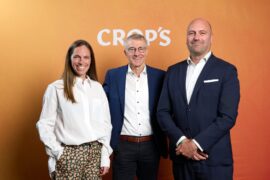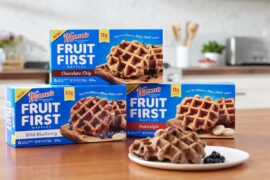Säkylä, Finland-based Apetit Plc, a grain trader and producer of vegetable, seafood and oilseed products, has reported that consolidated sales amounted to EUR 87.5 million for the period of January through March 2016. While the figure was down from EUR 91.5 million rung up in the first quarter of the previous year and profits dipped, the full-year operational EBIT is expected to improve year-on-year (EUR 2.6 million in 2015). Due to the seasonal nature of the company’s operations, a high proportion of the annual profit is accrued in the second half of the year.
“I am satisfied with the profitability trend compared with the previous year. We will continue to work to improve operational profitability,” said CEO Juha Vanhainen. “I am particularly pleased with the improvement in the profitability of the seafood segment, which has been experiencing difficulties for a long time in all of its countries of operation. The measures implemented within the profitability programs are producing results, and I anticipate this development to continue. Market prices in grain trading declined at the beginning of the year, and this lowered activity and increased uncertainty on the markets.”
 Apetit’s fresh-frozen vegetable products are colorful, nutritious and delicious.
Apetit’s fresh-frozen vegetable products are colorful, nutritious and delicious.
Approximately 25% of sales in 2015 were attributed to fresh and frozen vegetable-based convenience products made primarily from locally sourced raw materials such as potatoes, leeks, carrots, peas, swede, parsnips, celery, beetroot and spinach. The company’s aim is become the leading brand in frozen vegetable products, frozen ready meals and ready-to-use fresh vegetables in Finland and the Baltic countries.
Long Standing Relationship with Growers
Petri Pyysalo, technical manager at Apetit, said: “We have worked closely with contract growers in the Satakunta region of southwest Finland for more than 60 years. Essentially, good food is made from good ingredients, so the quality of the vegetables we use is the most important factor affecting our product quality.”
The company signs agreements with around 140 local farmers every year. It also sources certain items from select quality suppliers outside the Satakunta region, in European countries and further afield, since Finland is situated too far north to produce crops such as corn and peppers.
 Petri Pyysalo, Apetit’s technical manager, says that TOMRA Blizzard machines have improved quality of vegetable throughput and enhanced safety for ender users.But clearly, the nation’s almost endless summer days, when the sun never fully sets, offer great advantages to growers.
Petri Pyysalo, Apetit’s technical manager, says that TOMRA Blizzard machines have improved quality of vegetable throughput and enhanced safety for ender users.But clearly, the nation’s almost endless summer days, when the sun never fully sets, offer great advantages to growers.
“Finland is the northernmost agricultural country in the world, and this is something that you can taste in our vegetables,” said Pyysalo.
Arctic food production is characterized by short summers and low temperatures, combined with long summer days and short nights. This unique combination lends a specific taste and texture to the vegetables, and that’s why exports of Apetit’s tasty “midsummer night” peas have been especially popular in the Italian market since 1970.
“Our vegetables are harvested and frozen at their peak of freshness in order to naturally preserve that wonderful taste,” pointed out Pyysalo. “We wash them gently prior to blanching and subsequent quick-freezing to prevent the formation of ice crystals that would alter the texture.”
The company invests a significant amount of effort and money to assure the high quality of approximately 20,000 tons of frozen vegetables processed per year. This includes the utilization of state-of-the-art equipment to sort out foreign materials and maximize food safety along the way.
“We use TOMRA free fall pulsed LED cameras to make sure that no foreign materials enter the further production line after coming from the storing and mixing process and entering packaging lines,” said Pyysalo.
Impeccable Food Safety Record
 The installation of four TOMRA Blizzard machines has not only resulted in increased quality, but also enhanced food safety.
The installation of four TOMRA Blizzard machines has not only resulted in increased quality, but also enhanced food safety.
“Our record is impeccable, and we remain confident that all foreign material is being removed,” said the technical manager. “It’s an all-in-one package. We save money, the quality has improved, and food safety is guaranteed.”
Among Apetit’s customers are suppliers of raw materials used in baby food production. Those clients have been especially impressed to see the Blizzard in action, at it bolsters their confidence that all steps have been taken when it comes to food safety.
 TOMRA’S Blizzard system is able to inspect and sort millions of vegetable pieces per hour, efficiently rejecting undesirable foreign matter and discolored product from fast-moving conveyor belts.
TOMRA’S Blizzard system is able to inspect and sort millions of vegetable pieces per hour, efficiently rejecting undesirable foreign matter and discolored product from fast-moving conveyor belts.
“During the initial installation, our operators received special training courses from the TOMRA team to learn how to use the sorting machine,” said Pyysalo. “Once you know how to operate the equipment, it’s very easy to work with. On top of that, it’s simple to clean. We are so impressed and satisfied with the Blizzard that we are installing one in each of our six packaging lines.”
He continued: “It’s a very cost-effective solution. For many years we considered buying new laser sorters, which are often thought to be the best machines for sorting IQF vegetables. But after seeing TOMRA’s pulsed LED technology in action, we were convinced that this technology was equally as good, if not better.”
Pulsed LED recognizes the subtlest color and structural differences as well as foreign materials just before packing. The benefits of this are numerous, as it is calibration-free, stable, and has a long lifespan. For example, the Blizzard is able to take out pea pods and stalks based on shape sorting.
“Our brand name is close to our heart, and we have to protect its reputation at all times. TOMRA’s Blizzard sorting machine adds to this protection,” concluded Pyysalo.





